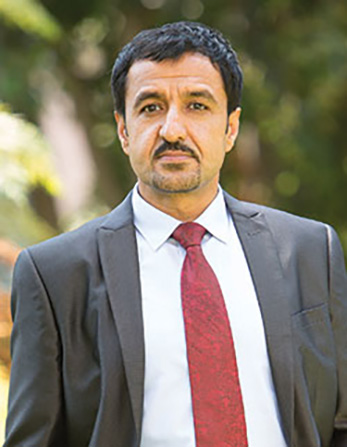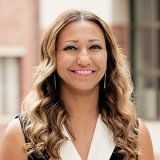As a young boy in Afghanistan, Azizullah Amir lost his mother in a way that has both haunted and stirred him as an adult, propelling his decision to become a physician and launch a one-of-a-kind educational facility.
Out of modesty born of cultural tradition, Amir’s mother didn’t want to see a male doctor, and there were no female doctors to treat her skin infection. As a result, the infection spread throughout her body and she died a few weeks later.
“From that time on, I was motivated to become a doctor and help prevent other kids like me from becoming orphans because their mothers had contracted a preventable disease,” says Amir, a cardiologist and founder of a private Afghan hospital, who is enrolled in USC Rossier’s Global Executive Doctor of Education (EdD) program. His plans expanded as he considered the barriers to education faced by many females in his country.

“Girls and women in Afghanistan are often prevented from attending coeducational facilities and have been deprived of educational opportunities for decades,” he explained. “Especially in the provinces, girls have been marginalized.”
According to UNESCO, in 2015 the literacy rate among Afghan women age 15 and over was one of the lowest worldwide, just 24 percent compared with 52 percent for Afghan men. And, the United Nations found that last year at least 96 schools that educate girls in the country were attacked.
So, in April 2016, he opened the Moraa Educational Complex in Kabul and invited Rula Ghani, the first lady of Afghanistan, to help inaugurate the new school. It’s remarkable for being the first center in the country dedicated exclusively to the educational needs of females from preschool to university, with a medical school as its centerpiece.
In addition to awarding medical degrees, the complex offers specialized programs for women in midwifery, nursing, anesthesiology, radiology, medical technology, dental prosthesis, physiotherapy and pharmacy as well as undergraduate degrees in computer science, business administration and education. All the staff are women, including faculty, administrators and support personnel.
To perform his new role of running this enterprise more effectively, Amir turned to the two-year Global Executive EdD program. “Because my profession of cardiology is a very different field, I wanted to get a formal education in leading and managing educational projects to be able to head this successful program for women in Afghanistan,” he explained. “USC Rossier is giving me the power and knowledge to deal with the challenges and policies required to implement and advance a successful educational complex.”
On track to obtain his doctorate in 2017, he points to valuable tools and lessons from his studies to date.
Before he joined the program and while managing his private hospital, Amir says, he used to jump to solutions before digging deep into the root causes of problems. He also did not focus on assessing the difference between current performance and required or desired performance, the process known as gap analysis, which students learn.
“That usually resulted in coming up with the wrong solutions and the real problems remaining,” he explained. “Now, in the program, once we carefully assess the current performance and find the gaps, we brainstorm for their potential causes. Then we start looking for the solutions systematically, and as we proceed with implementing the solutions, we continue evaluating performance as we reach toward our goals.”
From his fellow students at USC Rossier, Amir says, he also has learned critical thinking and patience.
Shafiqa Ahmadi, associate professor of clinical education at USC Rossier and Amir’s doctoral dissertation adviser, is well aware of current conditions for women in what was her home country, and is very supportive of Moraa. Her family fled Afghanistan in 1984 during the Soviet occupation, when she was a child, and settled in the United States in 1987. At that time, she says, there were no barriers for girls seeking an education. Now, she points out, girls, particularly in rural areas, are sometimes threatened when they attend school.
“I think Aziz’s educational complex is an amazing endeavor that will be really helpful for women in Afghanistan,” said Ahmadi. “Aziz knows that without an education, women will not know about their fundamental rights. His school also gives families peace of mind that it will be run mostly by women, and there will be no mixing of genders.”
Amir knows from personal experience what it means to make critical family decisions. He is the father of eight, including five daughters who are all studying at Moraa, including one in the medical school.
Currently, there are 220 students at Moraa, with plans to expand by establishing branch campuses in the provinces. Amir especially wants to attract students who would otherwise not be allowed to get an education because of family objections to co-ed schools, and women whose education was interrupted because they married very young and had children.
Although optimistic about the complex’s future, he still has concerns. Chief among them is security, especially given the recent violence at the American University of Afghanistan. Amir says that Moraa is probably safer than other educational centers in Kabul because of its location—away from main roads as well as military and other government targets—as well as its physical structure. Still, security has been increased at Moraa, and more funding is being sought for further improvements.
Amir also faces various infrastructure challenges, such as a lack of high-speed Internet and inadequate library resources. To meet these needs, he is hoping that Moraa can affiliate with universities in the United States.
Despite such difficulties, Amir plans to remain in Afghanistan and expand the complex’s outreach.
“Our country will not remain the way it is now for our whole history,” he said. “So why not stay in Afghanistan, provide education, especially for women, and make dreams come true?”
*Thank you to all of our donors who generously supported USC Rossier during fiscal year 2016 (July 1, 2015, to June 30, 2016).




